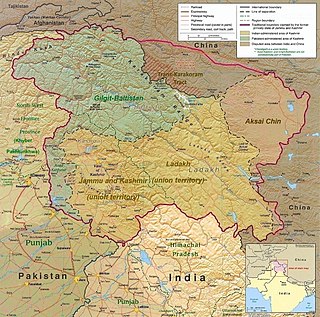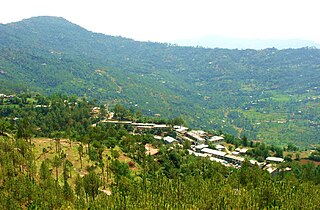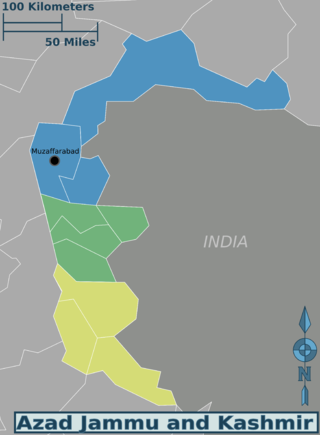Related Research Articles

Azad Jammu and Kashmir, colloquially referred to as simply Azad Kashmir, is a region administered by Pakistan as a nominally self-governing entity and constituting the western portion of the larger Kashmir region, which has been the subject of a dispute between India and Pakistan since 1947. Azad Kashmir also shares borders with the Pakistani provinces of Punjab and Khyber Pakhtunkhwa to the south and west, respectively. On its eastern side, Azad Kashmir is separated from the Indian union territory of Jammu and Kashmir by the Line of Control (LoC), which serves as the de facto border between the Indian- and Pakistani-controlled parts of Kashmir. Geographically, it covers a total area of 13,297 km2 (5,134 sq mi) and has a total population of 4,045,366 as per the 2017 national census.


The Srinagar District is an administrative district of Indian-administered Jammu and Kashmir in the disputed Kashmir region. It is one of the 20 districts of Jammu and Kashmir. Situated in the centre of the Kashmir Valley, it is the second-most populous district of the union territory after Jammu District as per the 2011 national census, and is home to the summer capital city of Srinagar. Likewise, the city of Srinagar also serves as the Srinagar District's headquarters.

Baramulla district or Varmul is one of the 20 districts in the Indian-administered union territory of Jammu and Kashmir in the disputed Kashmir region. Baramulla town is the administrative headquarters of this district. The district covered an area of 4,588 km2 (1,771 sq mi) in 2001, but it was reduced to 4,243 km2 (1,638 sq mi) at the time of 2011 census. In 2016, the district administration said that the area was 4,190 km2 (1,620 sq mi). Muslims constitute about 98% of the population among which Shia Muslims form 30-35% and Sunni Muslims form 65-70%.

The Poonch District is a district of Pakistan-administered Azad Kashmir in the disputed Kashmir region. It is one of the 10 districts of this Pakistan-administered territory. It is bounded on the north by Bagh District, on the north-east by Haveli District, on the south-east by the Poonch District of Indian-administered Kashmir, on the south by Azad Kashmir's Sudhanoti and Kotli districts, and on the west by Rawalpindi District of Pakistan's Punjab Province. The Poonch District is part of the greater Kashmir dispute between India and Pakistan. The district headquarters is the city of Rawalakot. It is the 3rd most populus district of Azad Kashmir.

Rawalakot is the capital of Poonch district in Azad Kashmir, Pakistan. It is located in the Pir Panjal Range.

Baramulla, also known as Varmul in Kashmiri, is a City and municipality of the Baramulla district of the Indian-administered Jammu and Kashmir in the disputed Kashmir region. It is also the administrative headquarters of the Baramulla district, located on the banks of the River Jhelum downstream from Srinagar, the summer capital of Jammu and Kashmir. The town was earlier known as gateway of Kashmir, serving as the major distribution centre for goods arriving in Kashmir valley through the Jhelum valley cart road.

Poonch or Punch is a district of the Jammu division of Indian-administered Jammu and Kashmir in the disputed Kashmir region. With headquarters in the town of Poonch, it is bounded by the Line of Control on three sides. The 1947-48 war between India and Pakistan divided the earlier district into two parts. One went to Pakistan and the other became part of the then-Indian state of Jammu and Kashmir.

Thorar is a town in Poonch District in Azad Kashmir. It is located about 20 miles from Rawalakot city, the capital of Poonch district.

Poonch, is a town and the administrative headquarters of the Poonch district, of the Indian-administered union territory of Jammu and Kashmir, which is part of the larger disputed territory of Kashmir. It is located near the Line of Control – the de facto border in the disputed region. Poonch shares a de facto border with the Poonch district of the Pakistan-administered, self-governing territory of Azad Kashmir.
The Delhi–Lahore Bus, officially known as Sada-e-Sarhad, is a passenger bus service connecting the Indian capital of New Delhi, Delhi with the city of Lahore, Pakistan via the border transit post at Wagah near Attari. The Routemaster bus number 10 was of symbolic importance to the efforts of the governments of both nations to foster peaceful and friendly relations. In its inaugural run on 19 February 1999, the bus carried the then-Indian Prime Minister Atal Bihari Vajpayee, who was to attend a summit in Lahore and was received by his Pakistani counterpart, Nawaz Sharif at Wagah. In August 2019 Pakistan decided to stop the service in the wake of India revoking Jammu and Kashmir's special status.
The Srinagar–Muzaffarabad Bus is a passenger bus service connecting Srinagar, the summer capital of the Indian-administered union territory of Jammu and Kashmir with Muzaffarabad, the capital of the Pakistani-administered dependant territory of Azad Jammu and Kashmir across the Line of Control (LoC)—the boundary line denoting rival areas of control in the disputed region of Kashmir, but which is not an official international border. The bus is of symbolic importance to the efforts of the two nations' governments to foster peaceful and friendly relations and follows the success of the Delhi–Lahore Bus, which was launched in 1999.
Transport between India and Pakistan has been developed for tourism and commercial purposes and bears much historical and political significance for both countries, which have possessed few transport links since the partition of India in 1947. In 2019, all public transport links between the two countries were severed because of Pakistani protest at India's revocation of the special status of Jammu and Kashmir. The only way for travelers to make this journey is to cross on foot at Wagah.
Mohammad Abbas Ansari was a separatist political leader and a well known Shia Muslim scholar, reformer, preacher and cleric from Indian-administered Jammu and Kashmir. He was known for his religious lectures and as a Kashmiri separatist, ex-chairman of the All Parties Hurriyat Conference, also founder & chairman of the Ittihadul Muslimeen also known as Jammu & Kashmir Ittihadul Muslimeen (JKIM) a Kashmiri nationalist Shia separatist political party which aims for Shi'a–Sunni unity in Kashmir & independence of Jammu and Kashmir from India through peaceful struggle. He is considered a moderate and has called for an end to violence in that region. He is Succeeded by his son Maulana Masroor Abbas Ansari.

The 2010 Kashmir unrest was a series of violent protests and riots in the Kashmir Division and Northern Jammu Division of Jammu and Kashmir, India which started in June 2010 after the Indian Army claimed to have killed three Pakistani infiltrators in which a soldier of the Territorial Army, a counter-insurgent and a former special police officer had found three young men from their Nadihal village in Baramulla district and killed them in a "staged" encounter at Sona Pindi. The protests occurred in a movement launched by Hurriyat Conference led by Syed Ali Shah Geelani and Mirwaiz Umar Farooq in the Indian state of Jammu and Kashmir in June 2010, who called for the complete demilitarisation of Jammu and Kashmir. The All Parties Hurriyat Conference made this call to a strike, citing human rights abuses by security forces. Rioters shouting pro-independence slogans, defied curfew, attacked riot police with stones and burnt vehicles and buildings. The protests started out as anti India protests but later were also targeted against the United States following the 2010 Qur'an-burning controversy. The riot police consisting of Jammu and Kashmir Police and Indian Para-military forces fired teargas shells rubber bullets and also live ammunition on the protesters, resulting in 112 deaths, including many teenagers and an 11-year-old boy. The protests subsided after the Indian government announced a package of measures aimed at defusing the tensions in September 2010.

The history of Azad Kashmir, a part of the Kashmir region administered by Pakistan, is related to the history of the Kashmir region during the Dogra rule. Azad Kashmir borders the Pakistani provinces of Punjab and Khyber Pakhtunkhwa to the south and west respectively, Gilgit–Baltistan to the north, and the Indian union territory of Jammu and Kashmir to the east.

The 2013 India–Pakistan border incidents was a series of armed skirmishes along the Line of Control (LoC) in the disputed Kashmir area. Starting from the mid-January 2013, they have been described as the "worst bout of fighting in the region in nearly 10 years". It began on 6 January 2013, when according to Pakistani reports Indian forces attacked a Pakistani border post, killing one soldier. Indian authorities claimed the incident as a retaliation against preceding Pakistani ceasefire violations, but denied having crossed the demarcation line. In a second skirmish on 8 January, Indian authorities said that Pakistani forces crossed the LoC, killing two Indian soldiers. The incident sparked outrage in India and harsh reactions by the Indian army and government over the news that the body of one of the soldiers had been beheaded. Pakistan denied these reports. On 15 January, a third skirmish reportedly led to the death of another Pakistani soldier.

In spring 1947, an uprising against the Maharaja Hari Singh of Jammu and Kashmir broke out in the Poonch jagir, an area bordering the Rawalpindi district of West Punjab and the Hazara district of the North-West Frontier Province in the future Pakistan. It was driven by grievances such as high taxes, the Maharaja's neglect of World War veterans, and above all, Muslim nationalism with a desire to join Pakistan. The leader of the rebellion, Sardar Muhammad Ibrahim Khan, escaped to Lahore by the end of August 1947 and persuaded the Pakistani authorities to back the rebellion. In addition to the backing, Prime Minister Liaquat Ali Khan authorised an invasion of the state, by the ex-Indian National Army personnel in the south and a force led by Major Khurshid Anwar in the north. These invasions eventually led to the First Kashmir War fought between India and Pakistan, and the formation of Azad Kashmir provisional government. The Poonch jagir has since been divided across Azad Kashmir, administered by Pakistan and the state of Jammu and Kashmir, administered by India.
Peacebuilding in Jammu and Kashmir includes confidence-building measures at a nation-state level between the governments of India and Pakistan, track two diplomacy, as well as initiatives by non-governmental organisations (NGOs), institutes and individuals. The purpose of peacebuilding in Jammu and Kashmir include conflict prevention and reduction of hostilities in the Kashmir Valley. Many countries such as Russia, United States and China have also played a de-escalatory role with regard to tensions in the region.
Pakistan's response to the revocation of the special status of Jammu and Kashmir started immediately after the revocation by India on 5 August 2019.
References
- 1 2 "Rawlakot-Poonch bus service inaugurated". DAWN.COM. June 21, 2006.
- 1 2 3 "Intra-Kashmir bus service completes six years". The Express Tribune. April 16, 2011.
- ↑ "Poonch-Rawalakot bus service starts from June 20". Brecorder. June 19, 2006.
- ↑ "Trade, bus services resume across LoC as tensions ebb". DAWN.COM. January 28, 2013.
- ↑ "Poonch-Rawalakot bus service resumes: Indian media". www.thenews.com.pk.
- ↑ "Poonch to Rawalakot: Pakistan suspends cross-LoC bus service". 20 August 2019.